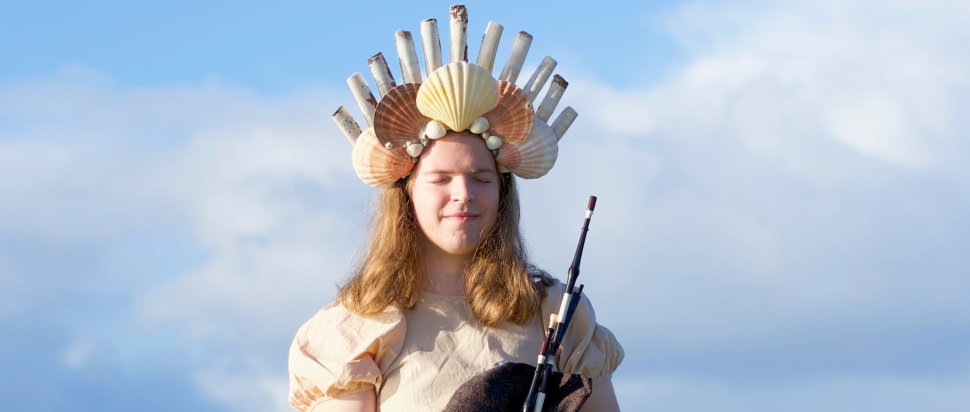Malin Lewis on piping, songwriting, and their Queen's Hall gigs
Ahead of the second installment of their new gig series at The Queen's Hall, we catch up with award-winning composer and small pipes player Malin Lewis
When we catch Malin Lewis, they’re in town for a preview of not for glory, a dance-theatre gig that examines the tradition of youth competitions in Celtic music and dance. It’s a collaboration with dancers Charlotte Mclean and Jack Anderson and blends Contemporary with Irish and Highland dance, tender storytelling with observational comedy – but more on that next year.
The next time Lewis is in Edinburgh it will be on 31 May for the second night of their Queen’s Hall gig series, Malin Lewis Presents. They’re programming four concerts across the year, each showcasing artists who have inspired them in some way, from childhood piping tutors to genre-blending peers. The lineup also demonstrates the trad scene’s frequent opportunities for shifting between these categories – for their tenth birthday Lewis was gifted a book of piper tunes by Allan MacDonald, who opened the launch night in March. Now they play duets with him onstage at The Queen’s Hall and help him work his computer as he lays out the music for his next book. “It's been a dream job,” Lewis says.
The May lineup features Frigg, a group whose combination of sparse, expansive melodies and detailed texturing has earned them the label ‘nordgrass’ – some of the group taught Lewis during their time studying at the Sibelius Academy in Helsinki. Also making the journey are Belgian-led Marvara (in Lewis’s words, “wild and off the rails […] like dance music but in all its forms”) and Me Lost Me, who plays with electronic folk songs and soaring vocals from behind a desk of electronics, loops and pedals.
“I wanted something wild and vocal to contrast the two instrumental bands and I'm hoping it's going to be a really nice unusual gelling of that," Lewis says. "I think it's really sounds that people might not have heard before – and I say that tentatively because it's a bold statement.”
Lewis puts a lot of care into the live music experience – they place a lot of importance on eye contact between performers, and they talk a lot about the role of the intangible vibe in taking an audience to where you want them to go to emotionally. They also appreciate the craft and subtlety that goes into laying down a recorded track, and understand that these are two separate but equally important disciplines.
Powered by RedCircle
For them, writing always begins with melody. “I will write around ten to 20 melodies a week, but that's like tiny little things and most of those will never come to fruition.” Doing it often enough, patterns begin to emerge from these sketches – Lewis looks for things that break the pattern, that feel fresh.
“I try and find the beauty and the discomfort, like finding a little interval on the pipes or the fiddle that feels obscure, like it doesn't necessarily feel easy to play… Sometimes I will get an instrument that I can't play and force myself to write a tune on it because it makes me actually listen to the melody and not fall into the patterns and shapes my fingers make."
Lewis plays an unusual form of small pipe called the Lindsay System – piper Donald Lindsay designed them over a decade ago using a 3D printer, and at 18 Lewis asked if they could have a crack at making a version by hand. The chanter has twice the range of a standard bagpipe and a full range of chromatic possibilities, its tone and emotional scope far removed from traditional Highland bagpipes.
Because the instrument is barely a decade old, it has no set repertoire. “The process of making that instrument was also composing new music for it… And so writing tunes for it, it tells me what it wants to write.
“I haven't had 15 years of habitual learning on this thing of like, these are the ‘correct’ sounds to make," they continue. "It has different intervals and different sounds and shapes that fit naturally under the fingers and that's been probably the biggest musical inspiration for me.”
This notion of what you’re ‘supposed’ to do with an instrument, of the ‘right’ way of doing things comes up time and again, even though Lewis has already spent so much of their artistic life reshaping traditional practice. "As a musician, I do have, sadly, an idea of what is right and wrong. And so much of improvising and exploring new work is about, not necessarily undoing, but at least examining and questioning: why do I want this to be right? Who am I trying to prove this to? What am I trying to prove?”
Malin Lewis Presents... Frigg, Marvara and Me Lost Me, The Queen's Hall, Edinburgh, 31 May – tickets here
Listen to an extended version of this chat in episode one of our new music podcast – available now via Apple Podcasts, Spotify, Amazon Music, and wherever you get your podcasts
